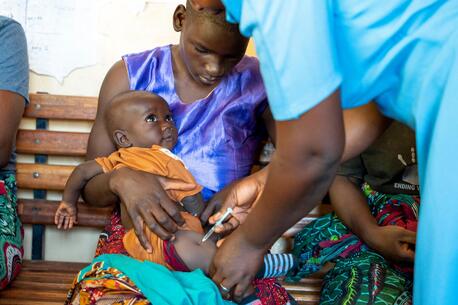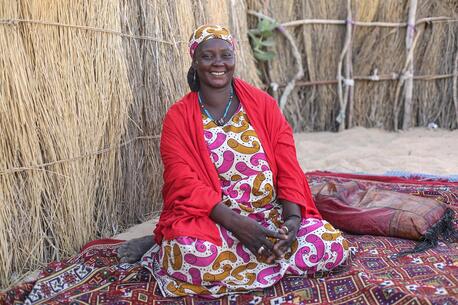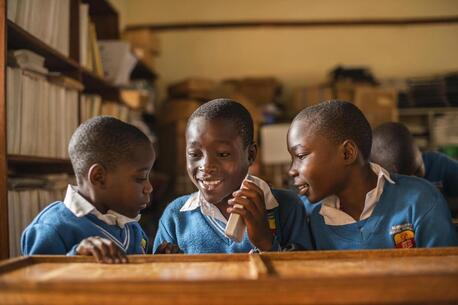
How UNICEF Fights to Protect the Rights of Children with Disabilities
There are 240 million children in the world who are living with a disability. UNICEF works with partners to help ensure they are not left behind as the world continues to make progress on the sustainable development goals. Meet some of the children who are benefiting from UNICEF support.
UNICEF’s vision: inclusion for every child
Every child has the right to grow up feeling happy, safe, and loved. Free to play and learn with their peers. Free to find a sense of belonging in the world and to feel valued – at home, at school, and within their community.
For decades, UNICEF has worked to advance the rights and well-being of the world’s most marginalized and excluded children – including children with disabilities.
UNICEF is committed to supporting all children in all settings, including children with disabilities, to the fullest realization of their human rights, free from discrimination, stigma, exclusion, and violence. Through its Disability Inclusion Policy Strategy, UNICEF has committed to accelerating action on a number of strategic priorities across all its programming. These include:
- preventing stigma, discrimination, neglect, and violence against children with disabilities
- promoting diversity and inclusion to transform attitudes, practices, and social norms around disability
- improving disability-inclusive infrastructure, services, programs, workplaces and coordination platforms
- ensuring access to comprehensive community care and support services, within and across sectors, as well as to assistive technology (wheelchairs, screen readers, hearing aids, or spectacles) and other relevant services that maintain or improve an individual’s functioning, independence, participation, and well-being
- supporting disability-inclusive action in emergency settings and fragile contexts and across the full humanitarian, peacebuilding, and development spectrum
- ensuring full and meaningful participation of persons with disabilities in their communities and in society by creating and monitoring enabling and accessible environments
Inclusion is at the heart of what UNICEF does, driven by its longstanding commitment to ensuring that all children, no matter where they live or what their circumstances, have a fair chance in life.
Here are a few of the children benefiting from UNICEF's support:
Maurine, 16, Cameroon
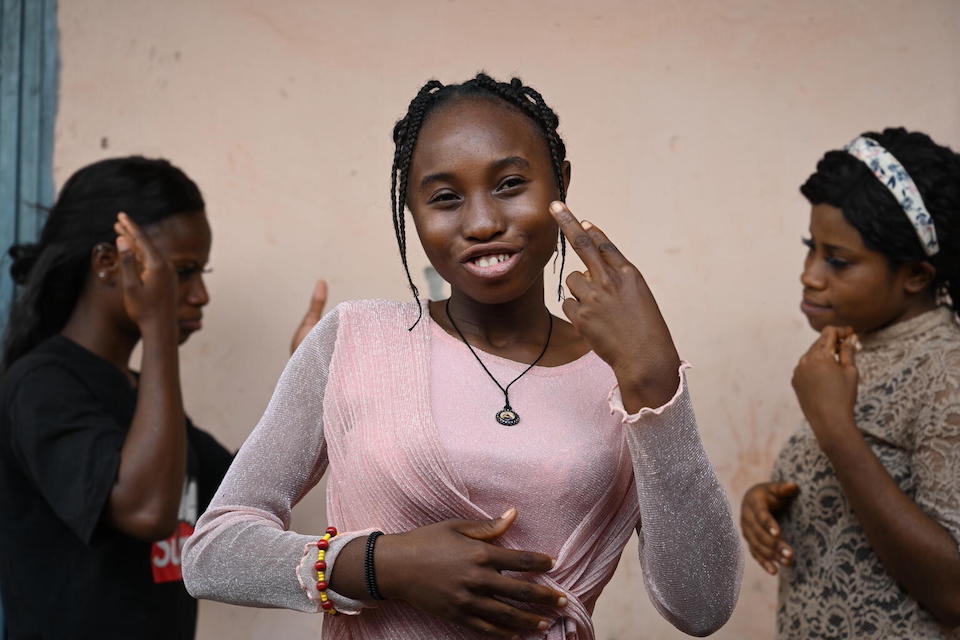
Maurine, 16, of Bertoua, eastern Cameroon, is hard of hearing. She attends sign language training sessions offered to the community through a UNICEF-funded initiative. The program helps young girls to learn sign language and also provides support to those who want to start a business and become more independent.
“My biggest problem at home was that I could not communicate with my family," Maurine shares, with help from her sign language teacher. "Therefore, I was pushed aside, deprived of attention and affection, and left alone. Communication with sign language is now my strongest asset. I can say what I want to say, express my feelings. My big dream is to have my own company where I can employ deaf and hard of hearing people."
Bohdan, 7, Ukraine
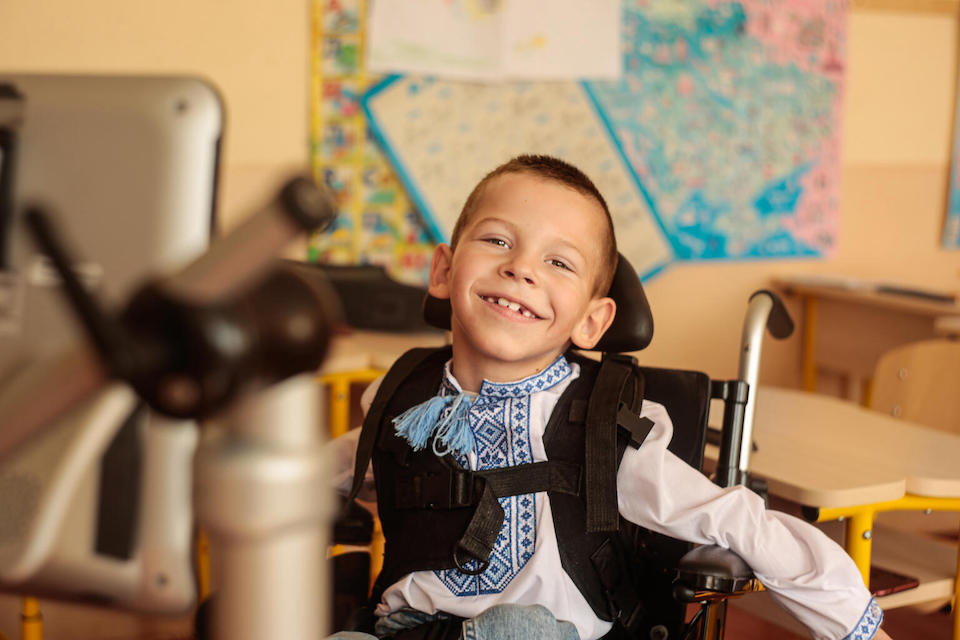
Bohdan has a complex developmental disorder and is unable to move or speak on his own. With a special eye-tracking device provided by UNICEF, however, his disability has not prevented him from attending school. By tracking the direction of the user's gaze and head movements, this kind of assistive technology can enable children’s access to learning and socialization – allowing them to exercise their right to an education. Depending on the unique needs of the user, the technology can also include screen readers, keyboards with special features, and hearing aids. Using the device, Bohdan can express his thoughts, interact with his classmates, and answer his teacher's questions.
Patricia, 10, Uganda
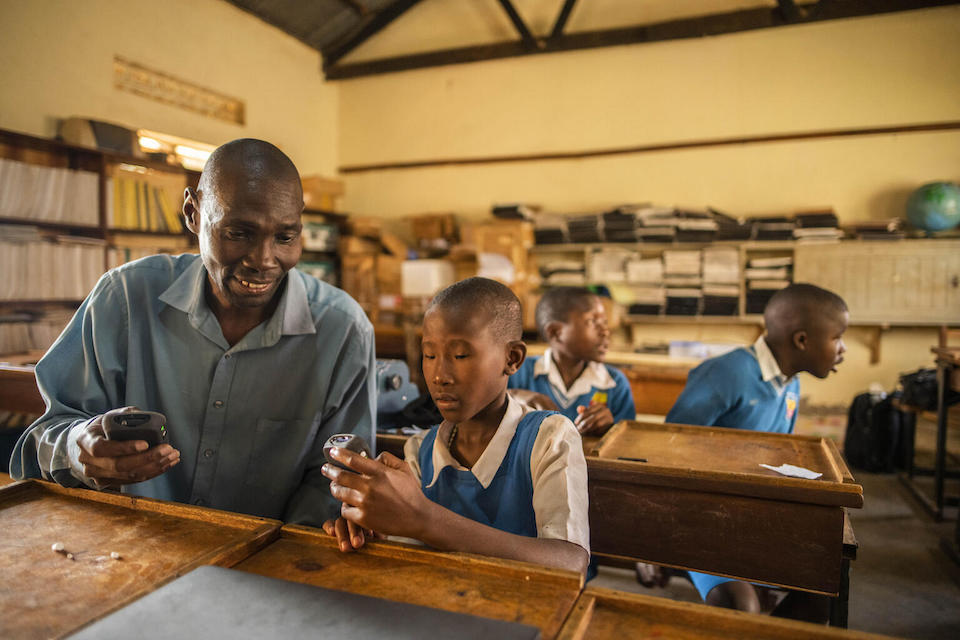
Special needs teacher Samuel Atuhairwe assists 10-year-old Patricia with operating the Victor reader, a device designed to assist students who are visually impaired. Students can use the device to record lessons and to access audio books so they can revise on their own. Patricia’s school is one of 20 schools in Uganda where new technology has allowed students with special needs to access reading materials. With UNICEF support, the Ugandan government is implementing an initiative that is focusing on developing more accessible materials for students that are blind, visually impaired, deaf, or hard of hearing. In addition to the Victor reader, materials include text-to-speech features through screen readers or direct narration. Pictures in books are also being graphically enhanced with the special software to better meet the needs of children with low vision.
Truc, 13, Vietnam
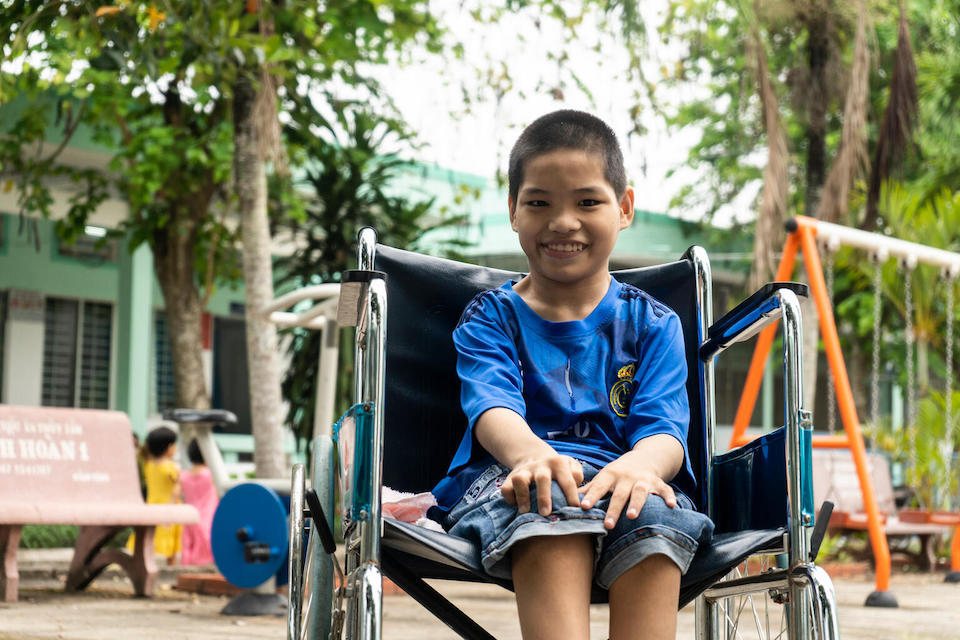
Truc, 13, attends the UNICEF-supported Social Patronage Center in Vietnam's Lanh district in Dong Thap province. She is among the thousands of children without primary caregivers who live in institutional care in the country – where the risk of physical, emotional, and social harm remains high. In Vietnam and other countries, UNICEF promotes care reform at the national and regional levels; objectives are to prevent the separation of children from families, prioritize family-based alternative care options in the community and end the institutionalization of children.
Due to factors such as stigma, discrimination, and lack of community-based services or support, families, caregivers and communities in many places around the world resort to institutional care. Children with disabilities are overrepresented in all types of alternative care and are more likely to be placed in residential care. They are also more likely to remain in alternative care, especially residential care settings, for an extended period of time in comparison to children without disabilities. Children with disabilities who are institutionalized are also more likely than children without disabilities to experience neglect, abuse, and violence, including sexual violence. The situation is particularly dire for institutionalized children with disabilities in contexts of armed conflict.
Dalton, 9, Mozambique
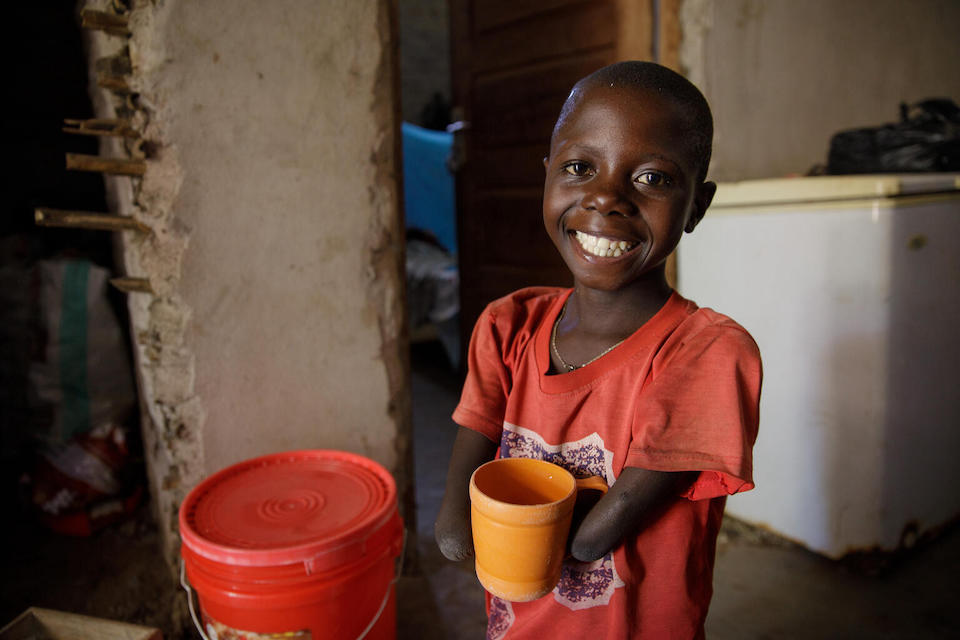
Dalton, 9, was born without parts of his upper and lower limbs. After armed groups attacked the community where he lived in Miudumbe district in Mozambique, his family was forced to flee. Despite his reduced mobility, Dalton made it through the bush alongside his mother Merina and baby brother João Vitor, then only 9 months old. They eventually reached Pemba, on Mozambique's northeastern coast, nearly 150 miles away from home.
Due to their hurried displacement, Dalton has no documents and is unable to attend school. UNICEF and its partners are working to ensure the well-being of children with disabilities in the area, providing services aimed at their inclusion in the community, such as the issuing of documentation and integration in local school and health systems.
Fatima, 8, Syria
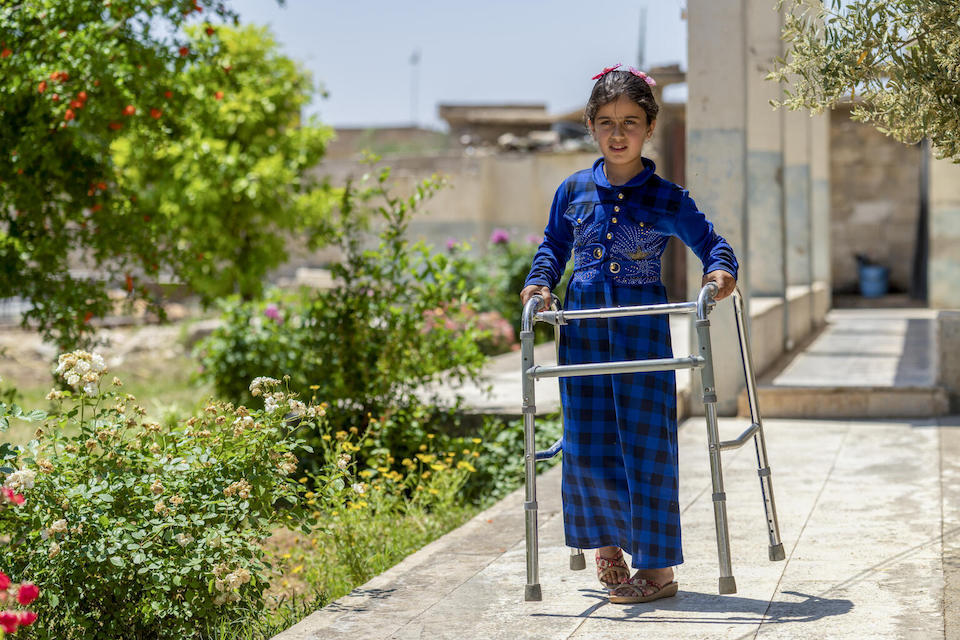
Fatima, 8, of Dair Hafer village in Aleppo, Syria, has muscular atrophy, a rare disease that weakens the muscles. With her father's small salary, the family struggled to pay for the medication and care Fatima needed — until UNICEF stepped in, providing cash assistance through a social protection program. With the support, Fatima was able to undergo her first surgery to help her walk more easily, and her parents can cover the cost of her medication and her physiotherapy sessions. “I’m thrilled," Fatima says. "My walking has improved and I’m not falling as I used to."
Ehsan, 14, Bangladesh
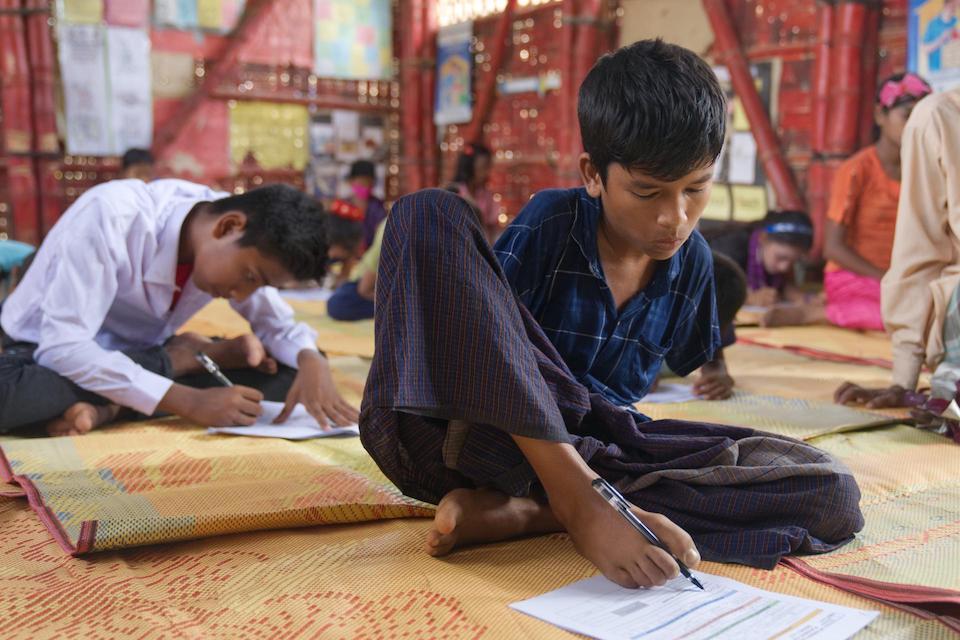
Ehsan, a 14-year-old refugee from Myanmar, lost his arms in a tragic accident last year, in which he was electrocuted after a live wire fell on him. The road to recovery was long; he was paralyzed for two months, and eventually had to leave school. But Ehsan didn't give up on his dream to complete his education. He resumed his studies with a tutor and when UNICEF rolled out the Myanmar curriculum last year, he enrolled himself in a learning center. A physical therapist from one of UNICEF’s implementing partners, Humanity & Inclusion, visited Ehsan every day to provide therapy for his legs, and over time he was able to walk again — as well as write with his foot. With support and care, Ehsan is once again finding joy in the classroom.
Denyireth, Venezuela
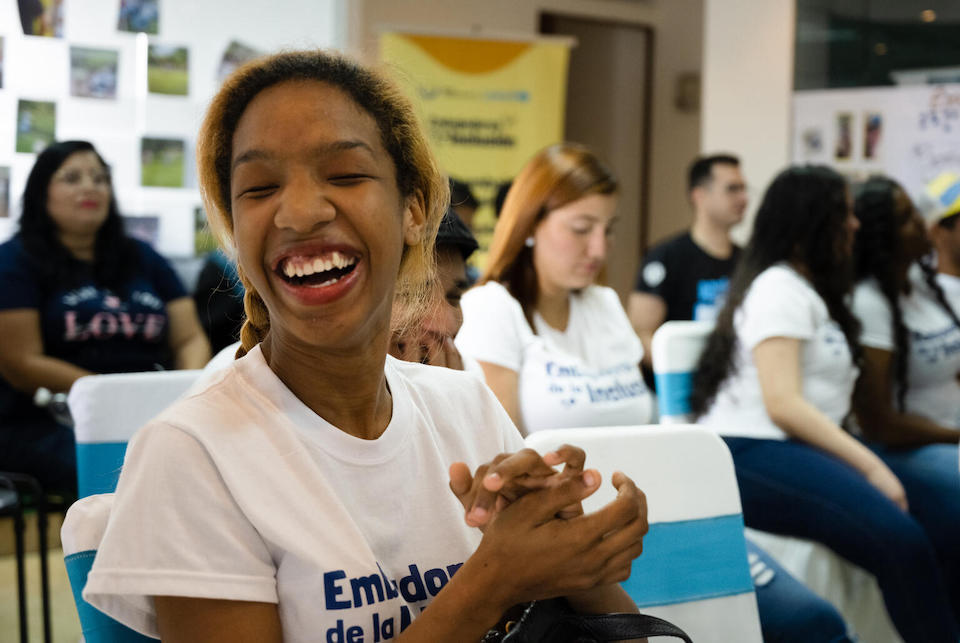
Denyireth smiles during the closing ceremony during which she — along with two dozen other young people who are deaf, hard of hearing, blind or deaf-blind — were named “Ambassadors of Inclusion” for completing a training program developed by UNICEF and implementing partner Vanessa Peretti Foundation (FUNVAPE) in Caracas.
The program covers various topics related to protecting the rights and well-being of children and adolescents with disabilities. Through the program, since 2022, over 4,200 children, adolescents, fathers, mothers, representatives and caregivers have received child protection services and psychosocial support; training in the prevention and response to violence — including gender-based violence — against children and adolescents with disabilities; guidance on how to identify and report barriers to accessing services; and other assistance.
UNICEF envisions a world where all children, including those with disabilities, live in barrier-free and inclusive communities; where children with disabilities are embraced and supported at every stage of life to realize their rights and achieve full participation in society.
Learn more about how UNICEF is supporting children with disabilities.
Support UNICEF's mission. Donate today.

